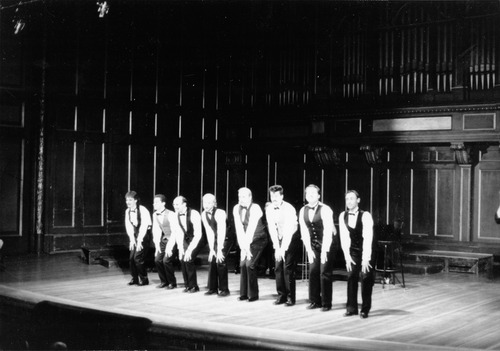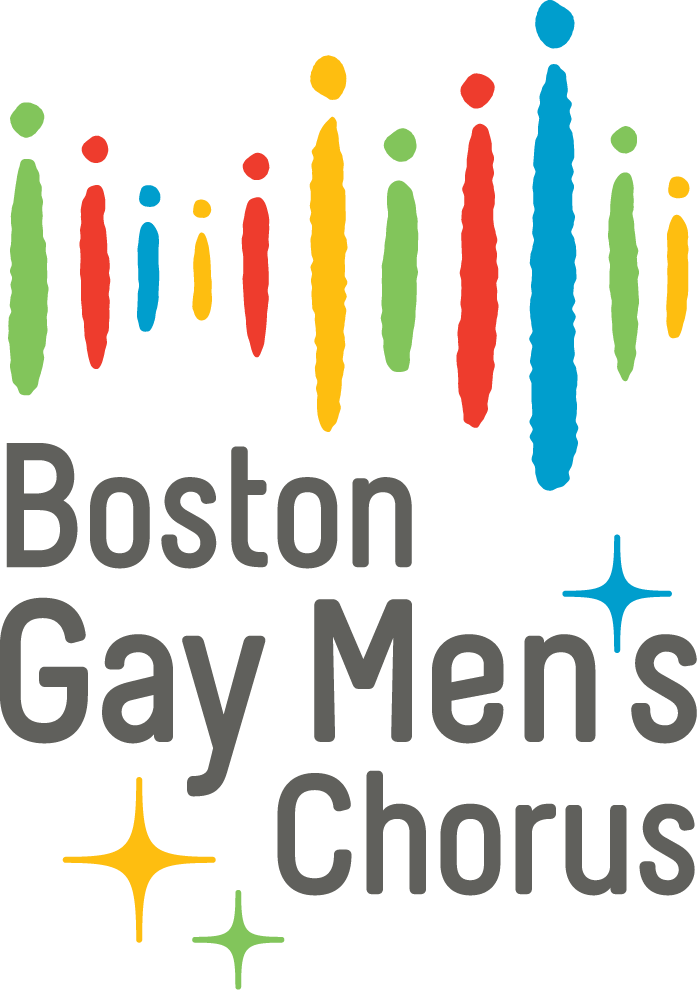
The founding of the chorus coincided with the greatest tragedy to hit our community: the AIDS epidemic. In the fall of 1983 we began another longstanding collaboration, this time with the recently founded AIDS Action Committee (AAC). On October 13, 1983, the BGMC held a concert to benefit AAC at Jordan Hall. Tickets sold for 5, 10, 15, 20, and 25 dollars. The concert was a resounding success, and the chorus was able to present AAC with a check for $2,353. More than 60 members of the BGMC performed in the concert that night. Sadly, within a decade, twenty percent of them would die from the disease. During this time, the chorus was still a young organization, still working through many things. BGMC President Dale Greenwood wrote an introduction that speaks volumes concerning the organization and its core values as they stood at the very beginning:
This concert has a very special meaning for the members of the Boston Gay Men’s Chorus. We extend our support and sympathies to the community at large during this time of health crisis. We wish to share and dedicate our songs tonight to benefit the AIDS Action Committee. At this time we would like you to know of our commitment by sharing our statement of goals and basic concepts.
The Boston Gay Men’s Chorus is a group of gay men who sing together to support each other, to grow and learn together, and to produce quality music for pleasure, pride and satisfaction of ourselves, our families our friends and our community. Our name was chosen to describe our multifaceted identity: we are a part of the Boston gay community, and as a men’s chorus, are a part of the local artistic community.
To us, being part of the Boston gay community means that we have a contract with that community to represent them, both within and outside Boston, and to entertain and enrich them with carefully programmed, high quality performances of a varied repertoire, representing universal as well as gay oriented themes. Our choice of themes and repertoire will be guided by our realization that we are gay men, but we will not exclude themes which are not gay if we believe that they will enrich and entertain our audiences.
One of the basic concepts of the Boston Gay Men’s Chorus is that of format and community involvement. The idea of a social contract between the Chorus and the rest of our gay “family” implies that we represent them musically to the community at large. This representation is in terms of developing a sense of identity, both social and artistic. We are a group of “amateur singers” in the best sense of the words, providing growth for our members, as well as reaching out into the community to develop their own sense of self worth.
Musically, our direction is toward creating the best, most enthusiastic presentations within our abilities. Attention to detail, both musical and stylistic, should carry out this feeling of gay pride. A sense of connection between the Chorus and the audience is very important, and achieving this requires a cohesiveness within the Chorus. We must maintain an attitude of friendliness with ourselves and others. This involves the idea of mutually “challenging” or supporting each other, creating an atmosphere of trust and cooperation within and outside the Chorus.
We look forward to singing for you in the future, not only for our mutual enjoyments, but also in celebration of the fact that we have come far enough “out” to have a gay men’s chorus here in Boston. Thank you for your support and enthusiasm. Watch for our upcoming concerts, special appearances and benefits.
This is an excellent summation of the chorus, and is as true today as it was decades ago at the time of our formation. Creating a new organization of any sort comes with a tremendous amount of stress. Trying to bring all these members to agreement as to what the chorus’s main values and goals were, and how they should be implemented, was a herculean task. To do so as an openly gay group in a time where there were few such organizations is remarkable.
This was a time where being gay was still “the love that dare not speak its name.” Director Lee Ridgway recently reminded us that during this time, many members of the chorus did not feel safe having their names printed in the program and other literature, so many uses pseudonyms. To protect confidentiality, members were also allowed to step out whenever the chorus was photographed.
